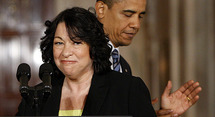
They attacked her in particular for public remarks that a "wise Latina" might be a better judge than a white male, in the process seeking to score political points by portraying the Obama administration's political and legal agenda as dangerously liberal.
While Republican National Committee Chairman Michael Steele admitted her confirmation was "a historic milestone," he signaled Obama may face a tougher battle when it comes to future nominees.
The sharpness of the divide over Sotomayor left longtime court observers bemoaning the partisan nature of the Washington political climate, especially as they viewed her past rulings -- with a few exceptions -- as centrist and uncontroversial.
"Her record reveals her to be moderate, and her 17 years on the federal bench, her background as a prosecutor and litigator, and her stellar academic record all make her eminently qualified for the Supreme Court," said Amanda Frost, a law professor at the American University in Washington.
That view was echoed by Susan Low Bloch, a professor at nearby Georgetown University who said the increasingly bitter mood in Washington did not augur well for Obama's next pick.
"This nomination should have been relatively easy. It does suggest that the next one will get an equally difficult time," she said. "It is the political climate we have now where very few senators believe in bipartisanship."
Frost agreed. "The opposition to Sotomayor suggests that no Obama nominee will be well received by Senate Republicans," she said. "The next Supreme Court nominee will face the same or greater Republican opposition."
Senator Kit Bond, one of the handful of Republicans to break with their party and support Sotomayor, told fellow lawmakers on the eve of the vote that he was fed up with "partisanship infecting every debate."
"The country is tired of every action by the Congress becoming a political battle," he added.
Sotomayor, 55, has served on the US Court of Appeals in New York since 1998, after a stint as a federal district court judge in New York. She was nominated by Obama in May to replace retiring justice David Souter.
Despite her balanced judicial record and scandal-free past, the Bronx-born nominee of Puerto Rican heritage garnered little support from the other side of the aisle and only nine Republican senators plumped for her in the end.
With Supreme Court Justice John Paul Stevens about to turn 90 and the only other woman on the court, 76-year-old Ruth Bader Ginsburg, recently learning that she has pancreatic cancer, it may not be long before Obama has to pick again.
--------------------------------------------------------------------------------------------------------------------------
While Republican National Committee Chairman Michael Steele admitted her confirmation was "a historic milestone," he signaled Obama may face a tougher battle when it comes to future nominees.
The sharpness of the divide over Sotomayor left longtime court observers bemoaning the partisan nature of the Washington political climate, especially as they viewed her past rulings -- with a few exceptions -- as centrist and uncontroversial.
"Her record reveals her to be moderate, and her 17 years on the federal bench, her background as a prosecutor and litigator, and her stellar academic record all make her eminently qualified for the Supreme Court," said Amanda Frost, a law professor at the American University in Washington.
That view was echoed by Susan Low Bloch, a professor at nearby Georgetown University who said the increasingly bitter mood in Washington did not augur well for Obama's next pick.
"This nomination should have been relatively easy. It does suggest that the next one will get an equally difficult time," she said. "It is the political climate we have now where very few senators believe in bipartisanship."
Frost agreed. "The opposition to Sotomayor suggests that no Obama nominee will be well received by Senate Republicans," she said. "The next Supreme Court nominee will face the same or greater Republican opposition."
Senator Kit Bond, one of the handful of Republicans to break with their party and support Sotomayor, told fellow lawmakers on the eve of the vote that he was fed up with "partisanship infecting every debate."
"The country is tired of every action by the Congress becoming a political battle," he added.
Sotomayor, 55, has served on the US Court of Appeals in New York since 1998, after a stint as a federal district court judge in New York. She was nominated by Obama in May to replace retiring justice David Souter.
Despite her balanced judicial record and scandal-free past, the Bronx-born nominee of Puerto Rican heritage garnered little support from the other side of the aisle and only nine Republican senators plumped for her in the end.
With Supreme Court Justice John Paul Stevens about to turn 90 and the only other woman on the court, 76-year-old Ruth Bader Ginsburg, recently learning that she has pancreatic cancer, it may not be long before Obama has to pick again.
--------------------------------------------------------------------------------------------------------------------------









 Home
Home Politics
Politics









